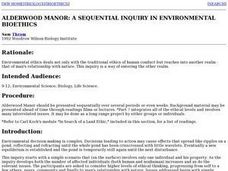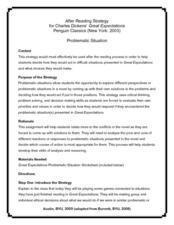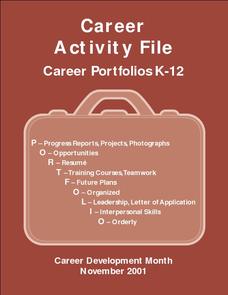Curated OER
Alderwood Manor: A Sequential Inquiry in Environmental Bioethics
Pupils explore bioethics. They discuss the traditional ethics of human conduct and man's relationship with nature. Students identify ethical dilemmas. They discuss ramifications of economic and ecological concerns with bioethics.
Curated OER
Case Study: Should the Results of the Human Genome Project be Sold for Profit?
Students investigate a case study and discuss whether scientists working on the Human Genome Project should be allowed to patent their work. They consider ethical and legal issues, and determine who owns genetic information.
Curated OER
Bioethics and the HGP
Learners analyze case studies using the rules and principles of ethics. They comprehend which rules and principles of theics are of great importance to the Human Genome Project. Students participate in mock student hearings.
Curated OER
Bioethics: Debates in the Science Classroom
Learners defend one side of a genetics ethics argument. They pull together a portfolio of human genetics and decision making skills. Students are allowed to prove what he/she has learned and express a personal opinion. They also are...
Curated OER
Pine Barrens
Tenth graders study environmental values vs. economic development. In this environmental decisions lesson students role play in a policy making setting.
Curated OER
The Artist As Entrepreneur: VARA-visual Artists Rights Act
Students read case studies of artists' lawsuits under the Visual Artists Rights Act and then discuss the merits of fictitious cases where artists might consider a lawsuit. They predict the outcome of a lawsuit scenario and justify their...
Curated OER
Issues in Genomics
Students explore the definition of ethics and genomics. In this organism lesson students participate in the chosen teacher lesson.
Curated OER
Innocent or Guilty: A Lab on DNA Gel Electrophoresis
Students use the prelab as an introduction to the importance of DNA fingerprinting- a form of identification that us being accepted by both scientific and leagl experts. They prepare a gel for electrophoresis. DNA fragments, which have...
PBS
Democracy in Action: Freedom Riders
This is a must-have resource for every social studies teacher covering the civil rights movement. Through an engaging video and detailed viewing guide, young historians learn about the Freedom Riders, and discover how everyday...
PBS
Journalism in War Time: What Does the Public Need to Know?
A viewing of the documentary War Feels Like War, launches an exploration of the importance of accurate and comprehensive war reporting. Groups investigate various news agencies and assess the factors that influence their stories. A...
Common Sense Media
Which Me Should I Be?
Impress upon learners the importance of considering how we identify ourselves online, and how this relates to overall considerations of safety and digital wellness.
Integrated Physics and Chemistry
Law of Conservation of Matter
Does mass change during a chemical reaction? Demonstrate the Law of Conservation of Matter while encouraging class members to be creative with a two-part lesson. First, learners use Alka-Seltzer® tablets and water to demonstrate the...
Facing History and Ourselves
Civil Rights Historical Investigations
The murder of Emmett Till, the Selma to Montgomery march, and the desegregation of Boston schools are the focus of three units that ask class members to investigate why these events were so key in the struggle for civil rights....
Curated OER
Noncombatancy and the Seventh day Adventist Church
Upper graders investigate how the Seventh Day Adventists are objectors to the practice of war. The lesson covers the Civil War and examines the church's position about the practice of war. The research extends to modern wars and learners...
Facing History and Ourselves
Do You Take the Oath?
Why did so many go along with Nazi policies during World War II? An investigatory unit includes four handouts, reading analyses, classroom discussion topics, and intriguing philosophical questions, helping learners understand the...
Curated OER
Great Expectations: After Reading Strategy
Class members are asked to consider how they would respond to situations faced by characters in Great Expectations. After completing one exercise as guided practice, individuals are presented with a second problematic situation and...
Florida Department of Health
Safe and Happy: Safety for All at School and Online Unit
Bystander or upstander and advocate? Three lessons have high schoolers investigating data about bullying and school safety. Participants then learn how to take a stand against bullying and use what they have learned to create a PSA to...
Curated OER
My School Job
Second graders discuss why classrooms have helpers to complete everyday tasks. In groups, they participate in a role-play activity in which they complete the assigned tasks. To end the lesson, they complete a worksheet in which they...
Curated OER
The Breaking of Charity
The danger of mob mentality is on display in The Crucible by Arthur Miller. Get your class thinking with some challenging quickwrite questions, then assign characters from the play to be read aloud altogether. Links to worksheets...
Curated OER
Kildare, USA: An Environmental Health Simulation
Your biology class plays the role of epidemiologist when a mysterious illness breaks out in Kildare, USA. Using interviews with doctors, patients, and local citizens, maps, the results from different materials sampling, they work to...
Curated OER
Antonyms 4
Explore antonyms of advanced vocabulary. High schoolers decide which words are antonyms to the 10 bolded words. Example words are distress, aptitude, concise, and stricken.
Curated OER
Note-Taking: K.I.S.S. "Keep It Short and Simple"
Note-taking is an essential study skill, and it needs to be taught! In the context of a research project on energy sources, learners find multiple sources, evaluating, paraphrasing, and citing them correctly. Two lists with note-taking...
Career Tech
Career Activity File
Pupils design career portfolios, which will demonstrate the skills and knowledge they have acquired during their schooling and personal endeavors, using the wide variety of worksheets and activities provided in this resource.
Curated OER
Science and Cloning
Here is an ambitious lesson which has learners take a look at which nations came up with the most important scientific inventions/advancements during the 20th century. Focusing on group work, cloning is explored. All of the worksheets...

























